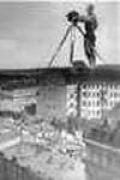
Directed by
Dziga Vertov
75 minutes
Rated G
Reviewed by
Bernard Hemingway


The Man With A Movie Camera
Dziga Vertov's film is one of the benchmark works of film history, a marvellous visual celebration of the rise of modernity in post-revolutionary Russia and the cinematic exemplification of the theoretical precepts of the Constructivist avant-garde. Whilst film students will be more attuned to the latter aspect, the film remains an impressive artistic achievement and a remarkable photographic record of the period.
The Russian avant-garde rose to State-sanctioned prominence after the 1917 revolution and very rapidly developed a wide-ranging portfolio of functions for their artistic activities, the overall purpose being the furtherance of socialist consciousness amongst the largely illiterate populace. Vertov's film was made with intention of re-educating the populace to become positively aware of the realities of modern life and to eschew the distraction of bourgeois melodramas and escapist entertainment. Differing somewhat from peers such as Eisenstein and Pudovkin, Vertov developed a double-pronged theory of film that he called Kino-Eye that on the one hand recorded "life-facts", without recourse to actors, story or props, and on the other re-combined these elements into a consciousness-raising artistic whole. The Man With A Movie Camera is the master-work of this intellectual agenda, one which takes a plethora of recorded material and structures it in a complex montage with it own identity.
It is, of course, ironic that it is this autonomous aesthetic identity which has preserved the film for history. The Russian masses preferred the sentimentalities of Charlie Chaplin's Little Tramp to having their consciousness-raised by experimental art films, whilst the state-controlled tendentiousness of socialist realism put an end to the avant-garde shortly after Vertov's film was released.
Evidently influenced by the now-classic photographic innovations of Aleksander Rodchenko and Lazlo Moholy-Nagy, and filmed by Mikhail Kaufman, Vertov's brother, The Man With A Movie Camera is a visual treat, its images running the gamut from photo-journalism to pure abstraction and utilizing a heady mix of visual effects whilst the editing by Vertov's wife, Elizaveta Svilova is ceaselessly dynamic, the entire film being carefully visually orchestrated by Vertov to embody his wide-ranging artistic ambitions. It is not to be missed, although a good deal of forbearance will be required with respect to Michael Nyman's insistent score. Whilst not as bad as Giorgio Moroder's musical "enhancement" of Fritz Lang's Metropolis it is in parts both intrusive and narcotic and it is a mystery why anyone considered it necesary to score Vertov's film, which was originally released without music, let alone went ahead after hearing Nyman's same old, same old.
Want something different?





